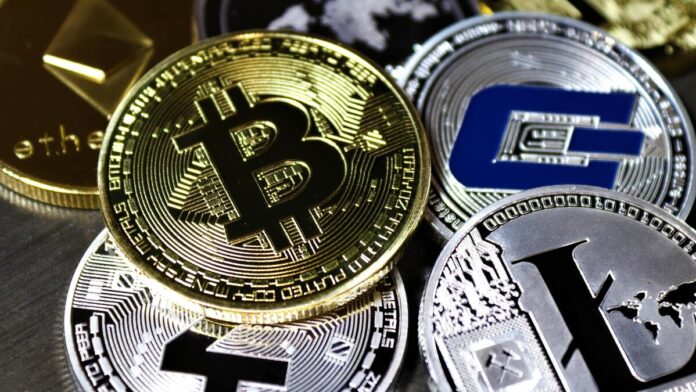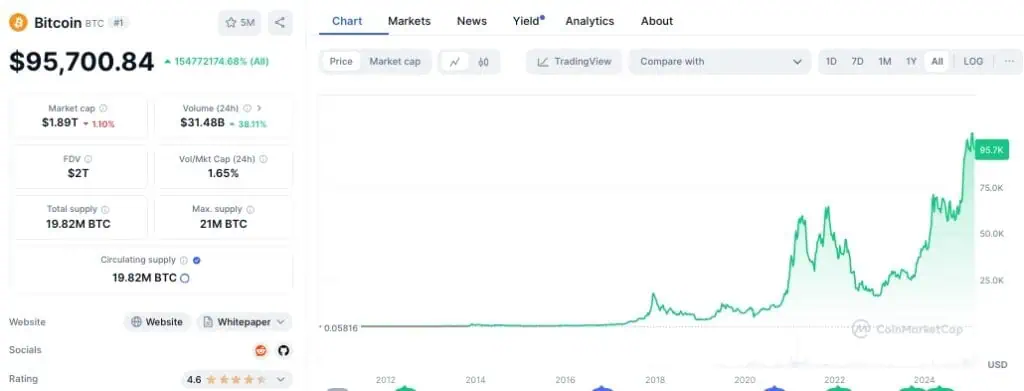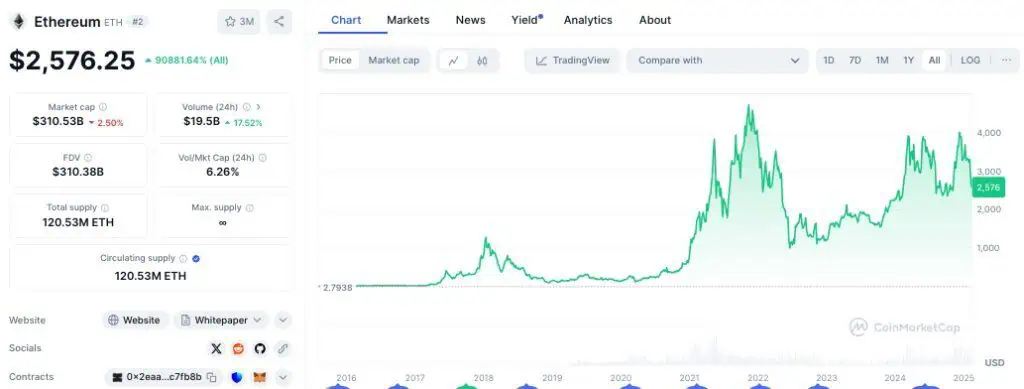
Bitcoin and cryptocurrencies are emerging as key tools to combat inflation, protect purchasing power and ensure economic freedom in the face of growing inflationary concerns.
Inflation, a major global economic concern, has led to an increase in the search for financial safe havens. Cryptocurrencies, led by Bitcoin, are gaining ground as potential alternatives to protect value against the increasing devaluation of fiat currencies.
Although historically, assets such as gold have been used to mitigate inflationary effects, in recent years, cryptocurrencies have emerged as an innovative and disruptive option to protect capital over time.
BUY BITCOINBitcoin: “Digital gold” in the age of inflation
Bitcoin, with its Offer limited to 21 million units, distinguishes itself as a deflationary asset designed to withstand inflation. Unlike fiat currencies, which can be printed without restriction by central banks, the world’s leading cryptocurrency offers a scarcity mechanism that makes it an attractive store of value for many.
This feature has led to significant adoption of Bitcoin in countries with unstable economies, where citizens turn to the cryptocurrency to safeguard their savings and conduct international transactions without relying on traditional financial institutions.
A prominent example of this trend is evident in Latin America, where Bitcoin adoption has seen an exponential increase in recent years. Chainalysis, in its cryptocurrency adoption index, highlights that countries such as Brazil, Argentina and Venezuela have positioned themselves as leaders in the adoption of Bitcoin and other cryptoassets, with a significant percentage of their respective populations using these Digital assets to protect against the devaluation of fiat moneyThis phenomenon underscores how Bitcoin is offering a viable alternative in economies where trust in traditional institutions has eroded.

Basic Bitcoin Course
Basic levelStart from scratch in Bitcoin in a clear, easy, safe and quick way. This course is specially designed for beginners practically know nothing about Bitcoin.
However, the inherent volatility of cryptocurrency markets remains a point of debate. Despite its potential as a hedge against inflation, the prices of Bitcoin and other cryptocurrencies can experience significant fluctuations over short periods, which can pose challenges for holders in the short term. Nonetheless, many investors and economists argue that in the long term, Bitcoin’s scarcity and growing adoption completely offset its volatility, cementing the cryptocurrency as a valuable asset in an inflationary environment.
Diversification as an anti-inflationary strategy
While Bitcoin is the most well-known and widely used cryptocurrency as a store of value, the crypto ecosystem offers a wide range of alternatives that can complement a diversified anti-inflationary strategy. stablecoinsFor example, cryptocurrencies whose value is linked to a stable asset, such as the US dollar, offering a less volatile option for many users looking to preserve capital in the short term.
But, in addition to stablecoins, other cryptocurrencies with unique characteristics, such as Ethereum, which powers a vast network of decentralized applications (dApps) and smart contracts, can also play an important role in inflation protection. By investing in innovative projects and technologies within the crypto space, investors can diversify their exposure and potentially earn inflation-beating returns.


Source: CoinMarketCap
However, it is crucial to conduct thorough research and understand the risks associated with each cryptocurrency. The crypto market is dynamic and constantly evolving, so it is essential to stay informed and adapt investment strategies to changing conditions. Diversification, combined with a solid understanding of the fundamentals of each asset, can be an effective strategy to mitigate risks and maximize the potential of cryptocurrencies as a hedge against inflation.
Regulations and global adoption
For cryptocurrencies to reach their full potential as anti-inflation tools, clear and supportive regulations that foster innovation and protect users are essential. Industry leaders such as Michael Saylor, President of MicroStrategy, and Dennis Porter, Co-Founder of Satoshi Act Fund, have urged governments around the world to adopt modern regulatory frameworks that allow for the safe and responsible development and adoption of cryptocurrencies.
On the other hand, global adoption also plays a crucial role in its ability to combat inflation. As more people and businesses use cryptocurrencies for daily transactions and as a store of value, their liquidity and stability increase, which in turn strengthens their ability to withstand the devaluation of fiat currencies. In this regard, education and awareness about the benefits and risks of cryptocurrencies are critical to boosting their widespread adoption.
A shield against inflation
In conclusion, cryptocurrencies are emerging as an innovative tool to combat inflation and protect purchasing power in an increasingly economically and financially uncertain world.
While Bitcoin leads this trend thanks to its deflationary nature, other cryptocurrencies such as Ethereum and stablecoins also offer valuable solutions to diversify anti-inflationary strategies. However, for these technologies to reach their full potential, such as financial refuge in times of inflation, clear regulations and greater global adoption are crucial.
In this context, the combination of technological innovation with favorable regulatory policies could mark a new chapter in the fight against inflation, where cryptocurrencies not only serve as financial investment assets, but also as true stable financial instruments that promote economic freedom and financial security.
PREPARE YOUR WALLETIMPORTANT: The content of this article is for informational purposes only and, in no case, what is written here should be taken as investment advice or recommendations. Bit2Me News reminds you that before making any investment you should educate yourself and know where you invest your money, as well as the pros and cons of the system. We separate ourselves from the actions and consequences that ignorance may entail. If you decide to invest in this or another asset class, you are solely responsible for the consequences that your decisions and actions may have.



